The trouble seemed to begin with the jackals, whose incessant noncturnal wailing left me both sleepless and furious. Desperate for peace, I thought the sound of my pistol would scatter them, and made ready to put my plan into action; but then there came a crash in the direction of the antiquities tent, and I (foolishly, in retrospect) hurried over to investigate.
Irene and McCormick must also have heard the disturbance, for they rushed to the scene as well. We discovered that Mohan, the guard posted outside the tent, was as stiff and unresponsive as a statue, and he remained in this peculiar state throughout the evening. (I will have to get his doctor's thoughts on this once I am well enough to leave my bed, as every movement is agonizing.)
In the chaos that ensued, McCormick shot and killed an intruder. To ascertain that the coast was clear, one of his soldiers went into the tent, were whereupon he was attacked by a second thief who lay waiting in the shadows. Unaware of his presence, I ran over to pull the man to safety, only to be attacked in turn. The thug got past me and menaced Irene, who stood between him and his freedom; so, with little recourse available to me, I struck him on the back of the head with the blunt end of a rifle.
Though I had not intended to injure him severely, I suppose in the excitement of the moment I swung too hard; indeed, I think I might have actually caved in his skull - I swear the weapon got stuck! - yet even this was not enough to subdue him, as he whirled around and slashed me with his knife. Thankfully, Irene was not hurt, and was able to trip him; he fell face-first to the ground and was knocked out cold. (A brave lass, that one.)
Mukherjee, one of McCormick's men, was kind enough to tell me what happened after I lost consciousness in the medical tent. It seems my attacker (to whom I shall henceforth refer as Mumbles), in addition to suffering a severe brain injury, nearly severed his tongue and lost a number of teeth when he fell. I doubt he will be in any shape to tell us much of anything, should he awaken, which is unfortunate but admittedly gratifying.
Per Mukherjee, the thief that McCormick killed had an advanced case of syphilis, resulting in a rather grotesque deformity to his manhood. I am also told that his skin was tattooed with many strange yantras, which may or may not be of any significance. If they have not already disposed of the body, I would like to take a look for myself and perhaps copy them into my notes.
Many mysteries remain: Who were these burglars, and from where did they come? What was it they sought with such murderous intensity? To my knowledge, we had not yet discovered anything of any substantial value; so I wonder, what else might have motivated their thievery, if not monetary gain? Might the artifacts be of some particular spiritual import for some sect or clan? If this is the case, should we expect more intruders?
Alas, these questions will have to wait; for now, my dressing needs changing and I desire morphine, so good Kiran has gone to fetch the doctor.
DO NOT FORGET
1. Speak with Mohan for his recollection of last night.
2. Ask Mohan's physician as to what might have induced total but temporary paralysis (i.e., local toxins, hypnosis, etc.).
3. Check with the doctors as to the severity of Mumbles' wounds and his prognosis. (Also, how was he able to function with the butt of a rifle embedded in his cranium?)
4. Examine the tattooed thief's corpse.
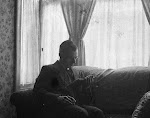
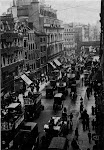
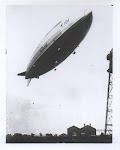
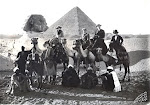

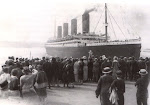


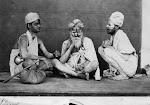

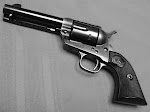
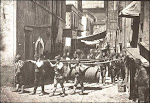


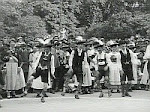
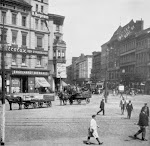
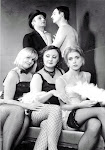
5 comments:
Shortly after Peter receives his stitches, another patient is brought into the clinic – the very soldier to whose side Peter had rushed. Shirtless, his wound – a nasty, deep puncture to the gut – has been bandaged. Noticing Peter's curiosity, Doctor Ayub offers, "His condition is not very bad," and closes a curtain around the man. For another hour, Peter watches nurses hurry from behind the curtain and back into its folds. He heard metal tools scrape against metal trays.
When he feels that the operations are over and that roaming around wouldn't disturb any vital medical work, Peter pulls himself out of bed. After some careful stretching, Peter works the sting into a dull biting sensation. It is now no worse than a torn muscle – indeed, his skin had since numbed – yet the pain spreads all across his abdomen. Nevertheless, he can stand and move. Peter gets to work on his to-do list.
One. Peter catches Private Mohan as he comes inside from a walk around the hospital grounds. "Arre, bhai sahib, it's not my mistake. I didn't see anything. It's just horrible you got cut, but I don't remember a thing. Oi! It's not like I was just standing there ignoring everyone, as Major said. Truth is I don't remember anything." He throws his cigarette down.
Two. Doctor Ayub is at his desk. Behind it is an open cabinet. Inside, a hefty jar filled with amber fluid sits on a shelf. Besides floating bits of fetal flesh, there is a prenatal animal of some kind contained within. A goat or one of the deer they call chital; maybe a cow. Unformed, stuck in this early stage of not-quite-life, it might have been anything. Dust covered medical books lean on the specimen. "It's very strange," says Ayub. Perhaps I should ask you first? What can you tell me?"
Peter recounts his short experience with Mohan's petrified state. "I see. And he was warm to the touch?" Yes, he was. Ayub snorts. He is wearing a long white kurta and, over that, a light cardigan. His beard is long and narrow, as is the fashion with elderly Musselmans. "To be frank, there are no signs of poisoning. As you saw yourself, he is in perfect health now. Apart from his memory loss, there is no sign of dementia or psychiatric disease. I cannot say what might have caused his condition." Pressed, he continues, "Of course – I can imagine any number of toxins that might render one unconscious, paralyzed, or both. But then he would exhibit some other kind of symptom, most assuredly. Drowsiness, nausea, more persistent paralysis . . . but he is doing well. I can think of only a fugue. And his stiffness – I have seen nothing like it. A trance is how it seems to me. Yes, like a Sufi or a sadhu." He takes his glasses off. "He must have been in a trance. I suspect that the man you caught knows better."
Three. ". . . but as for him . . . well, he has taken a beating, and won't be talking soon.
"You hit him quite viciously. No – don't bother about it, he will not die, and you were made to defend yourself. He is stable now, uncommunicative. I removed two inches of his tongue as soon as he arrived. Do not bother. It was broken. It had to go."
("As for your blow," he chuckles, "well, you hardly caved his skull in. There will always be a dent there. As I said: quite viciously you hit him.")
Four. Peter steals into the room where the corpse of the intruder lies. Two dirty calloused feet stick out from one end. Cautiously, Peter pulls the sheet away from the other. There is nothing particularly striking about his face – a broken mouth, gums stained red from chewing spiced betel nut, sun-darkened skin now ashen – such a face might belong to any sickly beggar on the streets of Lucknow or Bombay.
He pulls the sheet further down, revealing the man's chest. His nipples bulge out from individually tattooed rings. Below, symmetrical arcs suggesting the lines of a violin or other stringed instrument adorn his abdomen. At the top of his belly, the hint of a square can be made out.
The design invites Peter to lift the sheet a little farther. It is a yantra. Usually the sort of thing found as an amulet or as a design adorning devotional art in one's personal shrine, Peter knew that yantras were astrological tools used by tantric practitioners to influence the will of the gods. Mostly common trinkets; the rare precious example might be custom rendered for a wealthy merchant. It makes for an odd tattoo. Inside the square is an eight-petal lotus, and within that a six-pointed star. There are letters in the center of the star, within each of its points, and in every lotus petal. The letters are Sanskritic: unintelligible to Peter.
Ever so slowy peeling the sheet downward, Peter follows the arcs down to the scoop of the man's hip, but he lets no more than the top of the man's hairy pubis be exposed. To either side, a scatter of dashes and angles. Peter copies the yantra into his notes. He knows how the hours pass in this place – striving for accuracy will fill his time that much more completely. The unfamiliar Sanskrit letters do not let themselves be copied easily into his drawing; Peter remains unsure if he has gotten the proportions exactly right. But after two do-overs, the resemblance between the tattoos and the drawing in Peter's notebook is unmistakable. He adds in the arcs; then the rings around the man's plumped areolas.
Peter has not yet revealed anything of the thief's genitals, for the sake of preserving both his and the dead man's decency. Determined to complete the design, he tosses the sheet down to the man's knees. His penis, which should be relaxed, is shrunken into the thick hair. The man's scrotum is grotesquely dark and swollen; no trace of testicles can be made out in the blister-like lump. It looks and smells like ripe fruit, ready to burst.
To either side, a column or row of lines and curves – What is this? Peter recognizes the black scars on his hips: they are not unlike those marks hovering above the head of the horned god and his court of beasts, as depicted on the Pashupati amulet. They are certainly not the exact arrangement of items, but so very similar. Peter draws the marks into his notes.
In the end, the tattoos spread across two pages in Peter's notebook. On the otherwise blank pages, they seem incomplete, as if they are just hovering there. Disembodied. Perhaps it would be better to leave them that way.
(Peter passed an occult check. Working with the body is amply disconcerting; -1 sanity.)
To Mohan: "My questioning implies no blame to you, sir! I merely wish to understand your perspective better." He smiles disarmingly. "So, my good man - what is the last thing you can remember from that night, before things become cloudy? Had you consumed anything that tasted strange, or had an usual odor? Aside from the jackals, did you hear anything peculiar? Did anyone unfamiliar approach you on your watch? Had anything like that happened to you previously, or have you seen anything like before?"
*****
To Ayub: "To induce a trance, would not one need to get in relatively close proximity to the subject? And wouldn't such a procedure require time?" He adjusts his spectacles and leans closer. "Don't you find it strange, Doctor, that a trained guard would allow an intruder to approach him, let alone give him the opportunity to lull him into such a vulnerable state?"
*****
To the syphilitic corpse: "Ugh! Disgusting bastard." He wastes no time in covering up the body once his illustrations are complete, and muses, "I wonder if Irene could decipher these letters?"
The soldier looked at the ground and bit his lip. "Well, boss, I had a meal of dal and yogurt before I went on watch. I don't remember any jackals. But having thought about it, I remember having to sneeze." He twisted his mouth and fingered his chin a little comically. "And remembering that, I should think my nose has been dry."
Later, Ayub expresses his agreement with Peter. "Certainly I do think it's strange," he says, fixing his skullcap.
"Perhaps a drug after all, then? One of which I do not know, one which was administered from a distance? I am dubious – but there are many kinds of medicine in India. You Angrezees brought one kind, which is the best. And you have heard of the Ayurvedas?" He wags his finger. "Too bad that King Poros turned Sikander back! – In the Sindh, you will meet many old physicians who understand that the body runs on a completely different set of humors. They still practice the Unani medicines of Galen and ibn Sina, brought to the Orient by Sikander's doctors. Completely different humors – superior to the Ayurvedic doctors, who are always concerned about how wet or dry one is and how the climate causes everything. You will find many Unani doctors here, even at Aligarh University, where I studied. And then the tribal peoples have their own concoctions. Poisons for hunting . . . My point is:" he finally declares with a mild air of pomposity, "Who knows! Not Moses Hafiz Ali Ayub – MD." He pulls one corner of his mouth into a half-smirk and looks at Peter over the rim of his little glasses. "I know of nothing in the Ayurvedas or in Unani or in the West that is like this. If you would like to consult with some other kind of doctor, I may be able to put you in touch with them. But you will be staying here for another few days regardless.
"Doctor's orders," he adds.
Peter nodded in acquiescence with Ayub. "Yes, Doctor, of course. I would not want to jeopardize any of the good work you performed on my wound by rushing back to work before you advised it."
"But that does not mean I wish to spend my time here idly. And, since you offered, could I trouble you to arrange a consultation with these 'other doctors' you mentioned? I do not ask merely to satisfy my own curiosity, but to better understand the techniques of our assailants, and perhaps even devise some way of countering them."
"You would be more than welcome to join me in this, should you wish to, on the chance that you might learn some useful kernel as well."
*****
Later, when Peter returned to his room, he found Kiran there and said to him, "It seems I am to remain here for another few days at least. I am very sorry; I imagine it must be rather boring to have to watch over a sleeping Englishman! But, if I may ask even more of you, I would very much like to speak with Miss Howell and make certain that she is well. Would you be so kind as to pass word of this to your comrades, so that they may inform her when they return to the site?"
"I can," Ayub said. "There is an Unani doctor in Ihsaan Waahaan, but I do not think that your thieves were Muslims – the tattoos on the man whom Major McCormick killed look like something a Hindu or a Buddhist might have. The Ayurvedas are not as commonly practiced here, but I will ask my colleagues in Lahore when I travel there in three weeks. There will be someone who knows someone who knows someone, I am sure, and then you can meet with an Ayurvedic practitioner.
"Who you can see immediately is Ashan, the wrestling teacher. He is a Hindu, but he is well-liked by all the young men here in Ihsaan Waahaan. Due to him, we have the best wrestling school in sixty miles! He is also a doctor, though I think that he is best consulted for muscular aches and athletic injuries. I will send a nurse to fetch him – surely he will be flattered to hear that an Angrezee wants to talk to him! I warn you his English is not good. Ah, but you speak Urdu. Then again, Ashan is crazy.
"I will not be here today to meet him with you. My cousin's son is getting married in the next village. Good luck with Ashan-ji."
Later: "It is no problem," Kiran said. "Of course, Mister Peter, I will send word to her. Is there some letter you would like me to pass to the Sergeant for Miss Howell?"
(Ashan's visit will be the next day, the 24th. You should make your letter to Irene your next post.)
Post a Comment